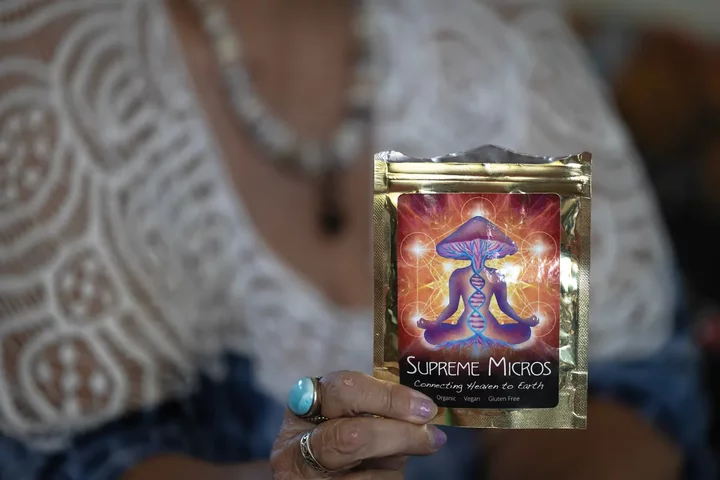Bonnie Metcalf shows a medicinal mushroom micro dose of Supreme Micros during her medicating session at her residence in Sacramento on July 20, 2023. California lawmakers on Feb. 6, 2024 submitted a bill that would legalize psychedelic therapies. Photo by Rahul Lal for CalMatters.
Gov. Gavin Newsom last fall signaled he was ready to bring psychedelic drugs into the mainstream of California’s mental health system, and a pair of lawmakers today submitted a bill to hold him to his word.
Sen. Scott Wiener, a San Francisco Democrat, and Assemblymember Marie Waldron, a San Diego Republican, are carrying a bill that would legalize psychedelic therapy. It would allow adults 21 and older to use the hallucinogenic drugs psilocybin mushrooms, MDMA, DMT and mescaline in a controlled setting and under the supervision of a licensed and trained facilitator.
The new proposal follows Newsom’s veto of a broader bill in October that would have decriminalized the possession of psychedelic drugs. At the time, he indicated he would support a measure focused on therapies.
“California should immediately begin work to set up regulated treatment guidelines — replete with dosing information, therapeutic guidelines, rules to prevent against exploitation during guided treatments, and medical clearance of no underlying psychose,” Newsom said in his veto message.
The new measure, Senate Bill 1012, would require the state to establish a licensing board that would develop training and oversight rules for therapy facilitators. Facilitators would have to screen individuals before they can participate. The bill also asks for the creation of a public-private fund to support grants for public health education related to psychedelics.
“I want California to be on the leading edge of psychedelic access for people seeking therapy, I also want California to be on the leading edge of public education and safety around psychedelics, and this bill will point us in that direction,” Wiener said in a briefing with reporters.
New research into psychedelic therapies
Growing research characterizes psychedelic drugs as promising in helping people address various mental illnesses, including depression and post-traumatic stress disorder. The U.S. Food and Drug Administration has not approved psychedelic-assisted therapies, although some may be close. In December, the nonprofit research group Multidisciplinary Association for Psychedelic Studies applied for FDA review of its MDMA-assisted therapy for PTSD. That review could come later this year.
Meanwhile, the Department of Veterans Affairs last month announced its intent to study psychedelics for the treatment of PTSD and depression. According to the department, this is the first time since the 1960s that it is funding such research.
Wiener said California can move forward on psychedelic therapies even though their status is uncertain with the federal government. “We are not waiting for the federal government to bless us,” he said. “We are addressing California’s legal obstacles to this therapy.”
Oregon last year became the first state to open centers that offer regulated psilocybin therapies. More than 700 people used these services in the second half of 2023, said Dr. Brian Anderson, a psychiatrist at UC San Francisco.
“And they had waitlists of thousands of people at the different centers,” Anderson said. “In Oregon, you see people coming from out of state, so we’d have to anticipate how many Californians would access this versus other people possibly wanting to access it, but there seems to be quite a demand.”
Bipartisan support for mental health measures
Several Republicans voted for last year’s decriminalization bill. Waldron said lawmakers from both parties support the therapies because they see a new need for new mental health solutions. She shared she’s heard from veterans and first responders who shared that psychedelics have helped them overcome severe traumas and suicidal thoughts.
“Our current approach to mental health has been criminalization and lack of access, we can do better,” said Waldron, who is also the author of a second bill that establishes a state workgroup to study psychedelic-assisted therapies.
A UC Berkeley poll last year showed that 60% of those surveyed supported psychedelics for therapeutic use, and 78% supported making it easier for researchers to further study psychedelics. Meanwhile, 49% said they supported removing criminal penalties for personal use.
A number of law enforcement unions, cities and the state lobbying group for district attorneys opposed last year’s decriminalization bill. Parents and several researchers also spoke at hearings on the bill, with some requesting additional safety and education components.
Outside of the Legislature, a group of doctors and advocates are gathering signatures to place a measure on the November ballot that would approve $5 billion in state general obligation bonds to create a state agency for psychedelic therapy research. The group has until March 20 to submit signatures.
###
Supported by the California Health Care Foundation (CHCF), which works to ensure that people have access to the care they need, when they need it, at a price they can afford. Visit www.chcf.org to learn more.
CalMatters.org is a nonprofit, nonpartisan media venture explaining California policies and politics.

CLICK TO MANAGE